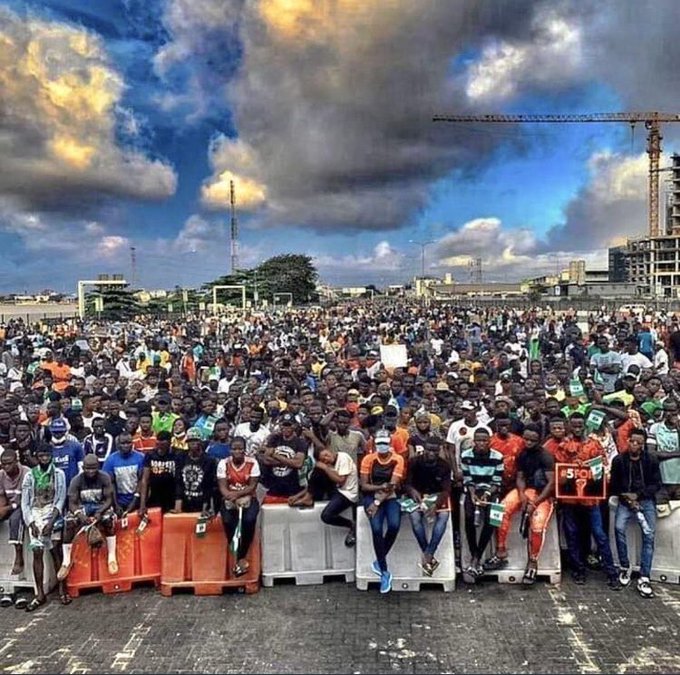
In October 2020, Nigeria witnessed a pivotal moment in its history as the #EndSARS movement took center stage. This social revolution, born out of a desire for justice, accountability, and an end to police brutality, shook the nation to its core. The echoes of that historic movement persist in the collective memory of the people, and the #EndSARS Memorial serves as a poignant reminder of the struggle for change and the pathway to revolution.
The #EndSARS movement emerged as a spontaneous outcry against the Special Anti-Robbery Squad, or SARS, a unit of the Nigerian Police Force that had long been accused of committing human rights abuses. The Nigerian youth, driven by their determination to confront a deeply entrenched culture of police brutality, launched a peaceful protest. These young activists, fueled by the power of social media, harnessed the strength of their voices and stories to unite people across the country.
Protesters shared tales of brutality, extortion, and abuse of power at the hands of SARS officers. Their collective voices echoed a call for justice and an end to the impunity that had allowed these abuses to persist for far too long.
The peaceful #EndSARS protests were met with a brutal crackdown in some instances. The most heart-wrenching of these incidents occurred on October 20, 2020, at the Lekki Toll Gate in Lagos. It was a night that will forever be etched in the memories of Nigerians. The tragedy unfolded as security forces were accused of opening fire on peaceful protesters.
The Lekki Toll Gate incident resulted in loss of life and widespread condemnation, both within Nigeria and globally. It underscored the urgency of the demands made by the #EndSARS movement, as protesters had called for an end to the very brutality that seemed to persist with such deadly consequences.
The #EndSARS Memorial stands as a solemn and poignant day of reflection. It serves as a day of remembrance for those who lost their lives, a symbol of the unyielding spirit of the protesters, and a testament to the importance of their cause. In the memorial’s shadow, we find ourselves at a crossroads. It is here that we must reflect on the lessons learned and chart a course for a revolution of values, accountability, and justice.
The #EndSARS movement demonstrated the power of collective action and grassroots activism. It showed that the youth are not just the future of Nigeria; they are the driving force of change today. The lessons learned from this movement can serve as a roadmap to a broader revolution, one that addresses not only police reform but also systemic issues that have plagued the nation.
A Call for Accountability: The demand for accountability remains central. The government’s promises of police reform and justice for the victims of police brutality cannot be empty words. The people have seen the power of their collective voice, and they will not be silenced until they see genuine change.
A Struggle for Good Governance: Beyond police reform, the #EndSARS movement highlighted broader issues of governance, corruption, and a lack of transparency. To walk the pathway to revolution is to demand a government that truly serves the people and respects the rule of law.
Unity Across Divides: The movement was a testament to the unity that can be achieved when Nigerians of all backgrounds come together. The pathway to revolution must include a commitment to bridge divides, fostering a sense of national unity that transcends ethnic, religious, and regional boundaries.
The Power of Youth: The youth are a force to be reckoned with. They hold the potential to reshape the nation’s future. The pathway to revolution involves the continued engagement of the youth in political processes and leadership roles, for they are the harbingers of change.
The #EndSARS Memorial is a sacred ground for reflection and remembrance, but it is also a call to action. It reminds us of the sacrifices made, the injustices endured, and the power of unity. It tells us that the pathway to revolution is not just a journey but a collective responsibility—a responsibility to hold our leaders accountable, to demand a better Nigeria, and to ensure that the voices of the youth are heard and acted upon.
The #EndSARS movement was a wake-up call, a moment of reckoning, and a declaration that the people’s demand for justice and reform is unwavering. As we remember the past, we must also look forward to a future where the echoes of the #EndSARS movement are heard in the corridors of power, and the pathway to revolution leads to a Nigeria that truly reflects the aspirations of its people.